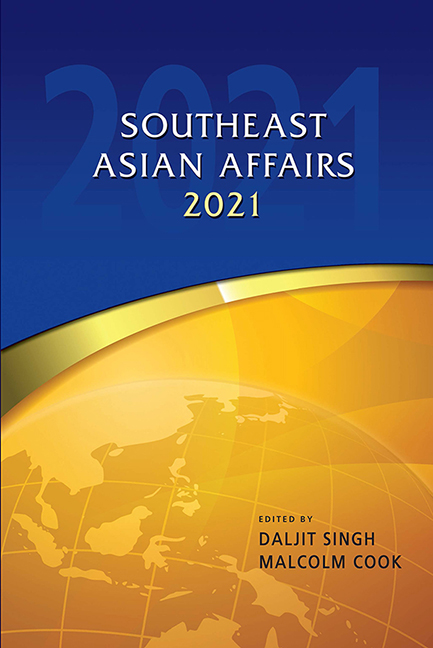Myanmar in 2020: Aung San Suu Kyi Once More Triumphant
Published online by Cambridge University Press: 09 October 2021
Summary
Like the rest of the region, Myanmar was under partial lockdown in 2020 as a measure designed to stop the spread of COVID-19. However, it was also an election year in a country that was experiencing continuing (and in some cases expanding) armed conflict, reeling from the aftermath of a mass migration of Muslim Rohingya from the northern Rakhine State and burdened with an economy that displayed few signs of growth. The lockdown of Yangon since 20 September 2020 has disrupted both the economic centre of the country as well as campaigning for the election. Conditions were far from ideal to conduct the third ever general election to be held under the army-drafted constitution of 2008, but the National League for Democracy (NLD) government insisted that the hustings proceed as scheduled despite calls for a postponement by several opposition parties.
The 2020 Election Campaign
The general election was contested by ninety-three political parties, which accounted for 6,742 candidates collectively. This was rounded up by a further 281 candidates who ran as independents in the election. With the usual campaign rallies and parades cancelled because of lockdown measures, Facebook became a central source of information for many voters during the run-up to polling day on 8 November. Both the NLD and the Union Solidarity and Development Party (USDP), which was formerly the ruling party and now the leading opposition party, relied heavily on Facebook, while other political parties, such as the People's Pioneer Party (PPP) (led by former NLD leader Daw Thet Thet Khine) and the Union Betterment Party (UBP) (led by former general Thura U Shwe Mann, who was the third-most senior in the junta), invested sums of money on their Facebook information campaigns.
The election was surrounded by controversy as many claimed that “democracy” under the NLD and its leader, Daw Aung San Suu Kyi (who wields real power as State Counsellor, a position she was anointed to after being constitutionally disqualified from holding the presidency), were becoming increasingly authoritarian since their electoral victory in 2015. Certainly, there were grounds for complaint, including the disenfranchisement of persons who are of the so-called Rohingya ethnicity. Some 730,000 of the Rohingyas had fled to neighbouring Bangladesh in 2017 following military reprisals after the Arakan Rohingya Salvation Army (ARSA) had attacked police stations in the northern Rakhine State.
- Type
- Chapter
- Information
- Southeast Asian Affairs 2021 , pp. 205 - 222Publisher: ISEAS–Yusof Ishak InstitutePrint publication year: 2021



